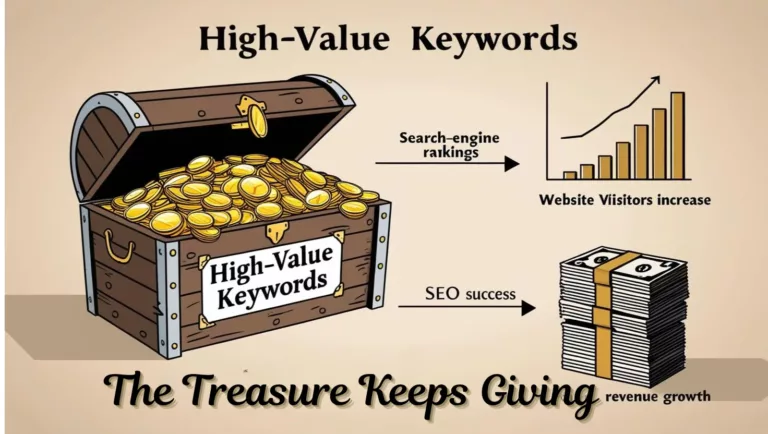Boost Your SEO Strategy! Secrets of High-Value Keywords
Learn How to Identify, Incorporate, and Adapt High-Value Keywords for Maximum Impact
Problems Mastered
- Traffic vs. Quality: Attracting the wrong audience can waste resources and hinder conversions.
- Keyword Confusion: Differentiating between high, medium, and low-value keywords can be challenging.
- Competitive Landscape: Navigating high competition in lucrative industries requires strategic keyword choices.
- Dynamic Search Trends: There is a need to constantly adapt to changing search behaviors and algorithms.
What You Will Master
- Focus on Intent: High-value keywords attract qualified traffic that’s more likely to convert.
- Utilize Tools: Keyword research tools like SEMrush and Google Keyword Planner can be used to identify opportunities.
- Balance is Key: Combine high-value and long-tail keywords for a comprehensive approach.
- Monitor Performance: Regularly analyze keyword effectiveness and adapt strategies accordingly.
- Learn from Success: Case studies show the tangible benefits of targeted keyword strategies.
My book is full of niche blogging tools. – From Blog to Bank: AI-Powered Online Business Growth: Monetize Your Knowledge (With A Complete Set of AI Prompts)
Join the conversation in the comments below and subscribe for expert tips on mastering your niche blogging journey!
Share your thoughts and experiences in the comments below, and subscribe for more insights on mastering your SEO strategy!
High-Value Keywords Bring in Traffic

High-value keywords are essentially the gold of the digital marketing world. They are the keywords that bring in not just any traffic, but the right kind of traffic. Think of them as the key players in your SEO strategy. These keywords have high search volume, substantial cost-per-click (CPC), and significant competition levels, which makes them incredibly attractive and worthwhile for businesses that want to capture valuable leads.
Their significance can’t be overstated. When you effectively use high-value keywords, you’re connecting with users who are more likely to convert. It’s not just about drawing any crowd; it’s about drawing the crowd that wants what you offer. This is why understanding them is crucial for building a solid foundation for successful search engine optimization.
The Value Hierarchy: High, Medium, and Low-Value Keywords
Not all keywords are created equal, and it’s important to differentiate between high, medium, and low-value keywords. High-value keywords have the most potential for conversion and engagement. Medium and low-value keywords might have their place in niche strategies, but when bigger targets are the goal, high-value keywords are your go-to. They typically yield higher returns and longer-lasting results.
Consider industries where high-value keywords make a visible impact. For instance, in competitive sectors like real estate, finance, and healthcare, harnessing the right keywords can position a business as a leader among its competitors. On the other hand, in a less competitive niche, even moderately competitive keywords can become high-value simply because they help you stand out.
Recognizing high-value keywords is about seeing their potential to drive traffic and intention-driven, qualified traffic. This targeted traffic is much more likely to engage with your content, leading to conversions, sales, or whatever key performance indicator (KPI) you are aiming for.
Identifying High-Value Keywords: A Step-By-Step Guide

Finding high-value keywords doesn’t have to be a guessing game. With the right tools and approach, you can pinpoint the keywords that are truly worth your time. Start by using reputable keyword research tools. Options like Google Keyword Planner, SEMrush, and Ahrefs are excellent starting points. These platforms offer insights into search volume, competition, and cost-per-click (CPC) which are critical metrics in identifying high-value opportunities.
Research tools help you uncover not just the heavy hitters but also those golden long-tail keywords. Long-tail keywords might have lower search volumes, but they often come with high intent and lower competition. For niche markets, these can be incredibly lucrative as they attract a targeted audience more likely to convert into customers.
Analyzing search intent is another vital step. It’s not just about getting clicks; it’s about delivering what the searcher needs. Keywords can signal different types of searches, like informational, navigational, transactional, and commercial. Understanding these intents allows you to tailor content that meets user needs, turning visitors into satisfied customers.
Balancing High-Volume and Long-Tail Keywords
When you’re identifying high-value keywords, think about balancing those well-known high-volume terms with strategically chosen long-tail variations. This approach allows you to capture a broad range of search traffic while maintaining high relevance to your audience’s needs. It’s about striking a balance, leveraging both high competition and more customized terms to maximize effectiveness.
Once your list of potential keywords is underway, it’s all about refinement. Prioritize them based on relevance to your business goals, the competitiveness of the term, and how well they align with your target audience’s searches. This thorough process ensures that when you plug these keywords into your content strategy, they’re primed for success.
Incorporating High-Value Keywords: Effective Strategies

Craft content that’s built around your high-value keywords but remember, it has to feel genuine and useful, not like it’s stuffed full of search terms. Start with a solid understanding of what your audience is searching for, then craft articles, posts, and pages that speak directly to these needs while naturally incorporating your keywords.
When it comes to on-page SEO practices, pay attention to where your keywords appear. Including them in title tags, meta descriptions, and headings boosts visibility. These elements are like signposts for search engines, showing them what your page is about. So, yeah, structure your content thoughtfully and don’t just shove keywords in wherever.
Optimizing Keyword Usage for Readability and SEO
Balance is key in keyword frequency. Too many keywords and your content starts to feel robotic; too few and you might miss out on optimization opportunities. Aim for a natural flow, where the keyword presence feels seamless yet sufficiently frequent to get noticed by search engines.
Placement matters just as much as frequency. Get those high-value phrases near the top of the page or in introductory sections to quickly clarify relevance. Varied forms or synonyms of your main keywords throughout the piece can help reinforce topic authority without sounding repetitive.
Optimize the user’s experience with clean, engaging writing. The goal is to blend keywords in a way that keeps readers hooked. Intuitive navigation, clear subheadings, and inviting visuals all play a part too. High-value keywords open the door, but quality content keeps readers inside.
Monitoring and Adapting: Keeping Your Keyword Strategy Fresh

Staying on top of your keyword performance is crucial in a digital landscape that’s always changing. Dive into analytics tools like Google Analytics and the various built-in features of your CMS or SEO plugins. They offer real-time insights that reveal how well your chosen keywords are driving traffic and conversions.
It’s important to adapt to shifts in search behavior and search engine updates. Algorithm changes can affect how your pages rank, which makes it essential to continually revisit and update your keyword strategies. Stay flexible and ready to pivot your strategy as needed.
Ongoing Keyword Monitoring and Optimization
Revisiting your content regularly ensures it’s up-to-date with the latest keyword priorities. Whether it’s a refresh of existing blog posts or a complete overhaul of landing pages, this process can have a significant impact on maintaining and improving your rankings.
Automation tools can be a game-changer here. Tools like Moz and Ahrefs can provide ongoing monitoring and reporting on keyword positions and performance. Set up alerts for significant changes so you know what needs attention and can adjust your strategy accordingly.
Remember that a proactive approach keeps you ahead. Regularly tweak and refine your keyword strategy not only to stay relevant but also to spot emerging opportunities before your competitors do. Those who adapt will thrive in the ever-evolving world of SEO.
Case Studies and Real-World Examples: Success Stories

Seeing high-value keywords in action can be incredibly inspiring for those aiming to boost their SEO game. Take companies that have managed exceptional growth by adopting savvy keyword strategies—they provide a roadmap of what’s possible when you get it right.
One standout example is a niche e-commerce business that skyrocketed its organic traffic by focusing on long-tail, high-intent keywords. By tweaking their content to align more closely with user searches, they not only climbed in search rankings but saw conversion rates soar. This case highlights the effectiveness of targeted keywords supported by well-crafted content.
Creating a User-Friendly Experience with Keywords
Analyzing the tactics that led to such success, it often boils down to thorough research and a willingness to adapt content based on real-time data. Successful businesses don’t just set their strategies and forget them. They engage in constant evaluation and modification, proving the power of flexibility in keyword management.
From these stories, learn the pitfalls to avoid in your own journey. Overzealous keyword stuffing or neglecting user intent are common missteps. Look at examples that didn’t go as planned; they offer valuable lessons about what not to do, ensuring your strategy remains sharp and effective.
Keep an eye on future trends in SEO to stay ahead. Keywords are the backbone of search optimization today, and understanding emerging patterns can guide your strategy. Be ready to embrace new keyword targeting techniques to catch the next wave of search engine behavior, leading your business to success.








